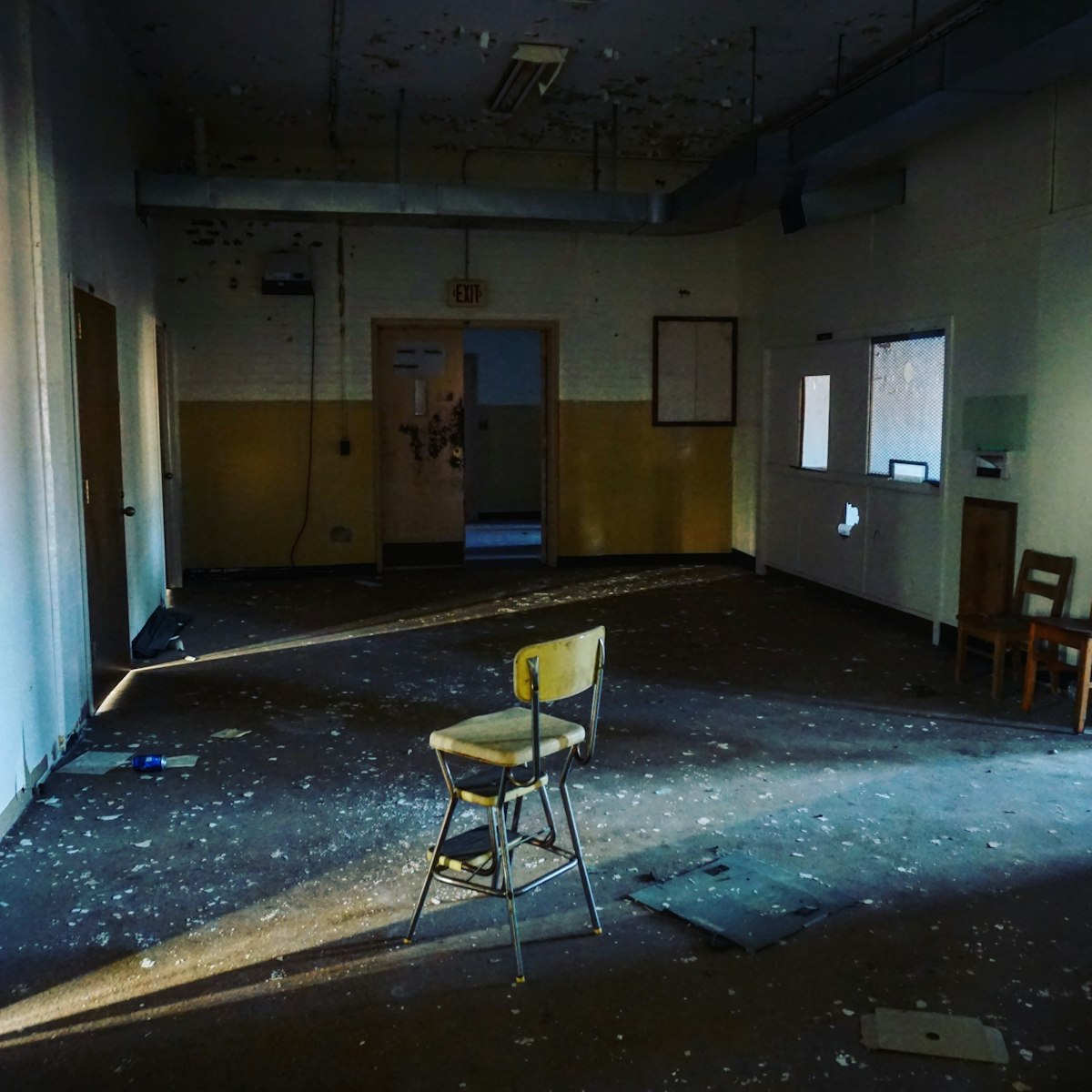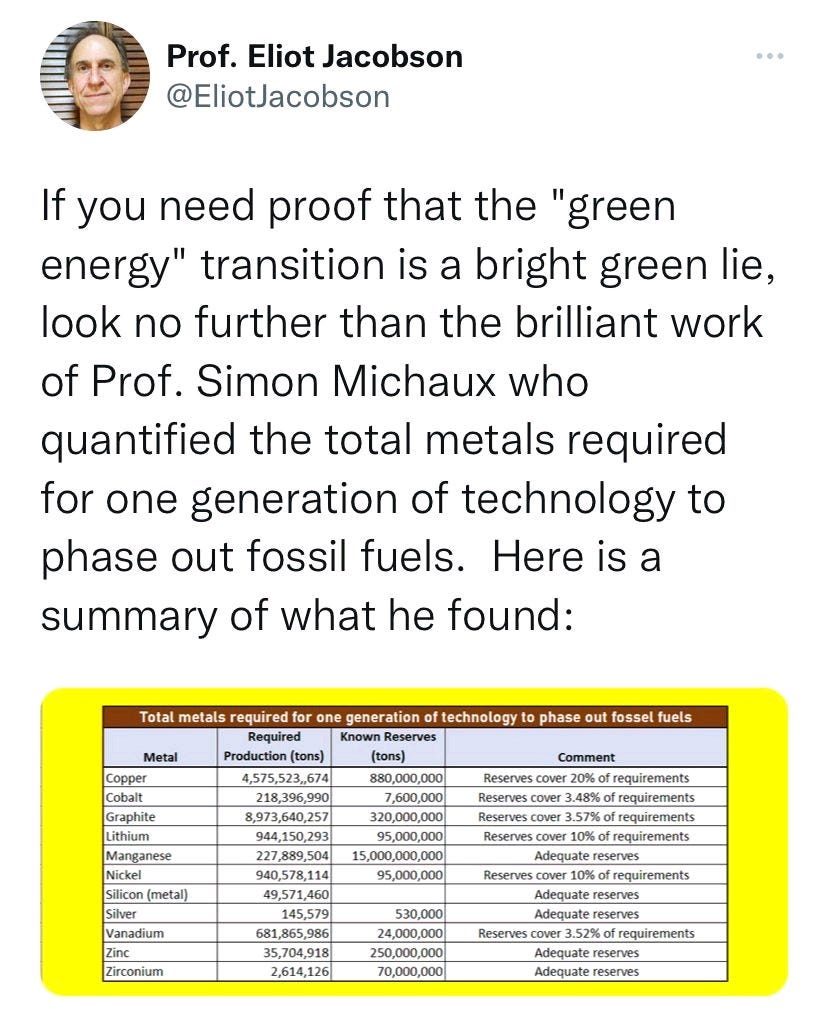I've got bad news, and worse news
This is what collapse looks like. Individuals, companies and governments reduce investment in things that make life better (e.g. renovations, home repairs, pay raises, infrastructure) to pay for things that are required for survival (e.g. food, energy, broken infrastructure).

I’ve got bad news and I’ve got worse news.
The bad news: the world doesn’t possess the known commodity reserves (e.g. copper, lithium, nickel) required to transition to green energy sources (see Professor Eliot Jacobson’s tweet below). These materials are needed to build batteries, solar panels, etc.

The worse news: since the raw materials don’t exist in sufficient amounts to transition to green alternatives we have no choice but to continue burning fossil fuels to supply our energy needs.
This conundrum = collapse.
The optimist will say that new technologies will emerge to increase the accessible and economically viable natural resources. While this is likely, the gap is so wide and runway so short there is little chance the world can transition to green energy sources at the speed required to avoid runaway global heating.
As an alternative, some propose we simply need to ‘de-grow’, returning to a lifestyle of decades (or even centuries) past. Perhaps we do, but as energy is highly correlated to economic activity and food availability the concept of voluntary ‘de-growth’ is simply infeasible, especially in a world with 8 billion humans.
Who’s going to put their hand up for a lower standard of living? Very few. Even if half the world voluntarily scaled back, others would use this to their advantage to consume more.
Instead, de-growth is thrust upon us by forces beyond our control. The financialization of the economy is evidence of this. Productivity and EROEI (Energy Return on Energy Invested) declines have increased dependence on financial chicanery to generate GDP growth. This is manifested by the declining marginal productivity of debt - the amount of GDP generated for each additional dollar of debt within an economy. Despite the massive growth in debt over the past couple decades, economic gains accrue to the few, while most fall behind.
Real growth in societal wealth has slowed partly because of a dearth of transformative innovation, compared to what was created during the 19th and 20th century (e.g. plastics, indoor plumbing, electricity, washing machines, highway system, automobile). [Note: I realize innovation still occurs. However, current innovations are more iterative (e.g. a faster computer) rather than transformative (e.g. spreadsheets).] The 200 year burst of life-changing inventions was a product of the discovery and ingenious utilization of energy, gifted to humanity by fossil fuels. Now those fossil fuels that once gave us abundance grow scarce and are paradoxically destroying everything around us.
Gains in societal wealth are slowing as the supply of cheap raw materials cannot meet growing demand. Moreover, as we lack the resources to transition to green energy sources, continued fossil fuel use will lead to more frequent climate disasters, increasingly diverting resources away from productive activity.
We don’t need to look far into the future to see this. Recently, record-setting droughts in China are pressuring the production and transportation of goods and food from China to the rest of the world. Droughts in the US and Europe also threaten food supply. Whether or not the world avoids famine remains to be seen, but at a minimum resources will be diverted from other value-added activities to food production, distribution and consumption.
This is what collapse looks like. Individuals, companies and governments reduce investment in things that make life better (e.g. renovations, home repairs, pay raises, infrastructure) to pay for things that are required for survival (e.g. food, energy, broken infrastructure).
You can tell how advanced a society is by the condition of its public bathrooms. Clean, well-stocked and widely available public bathrooms are a sign that a society has the means and willingness to make life better for all. A society that can’t feed its citizens won’t have money to pay for clean toilets. Perhaps this is an indicator to watch.
The signs are already here. Rising costs, widening wealth disparity, scarce resources, eroding middle class and rising civil strife and are all symptoms of a collapsing economic system. This is going to be a slow burn. But one day, we’ll look back and remember the good times.
For today, don’t worry. You’ll get your next paycheque and eat your next meal. But we live inside a deteriorating environment on which we rely for our abundance. It takes time to become obvious. Collapse starts with the superfluous, but eventually it will strike at the core of our existence.



